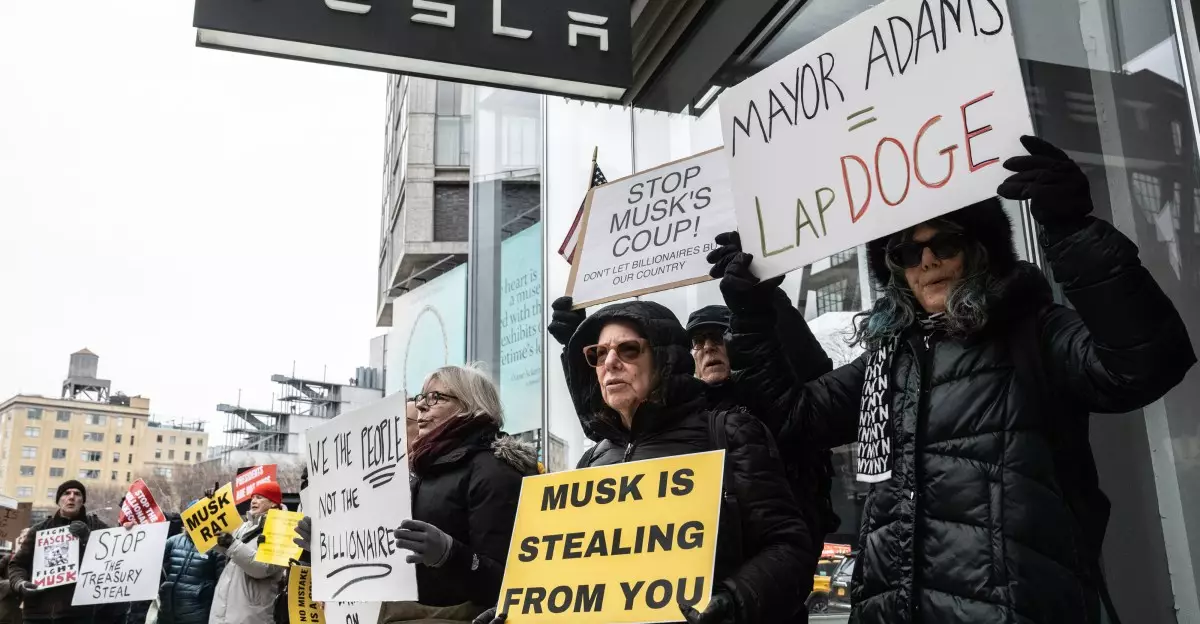Over the past weekend, demonstrations erupted outside Tesla showrooms in various cities across the United States, signaling a growing discontent amongst consumers and activists alike. The protests follow the viral trend of the hashtag #TeslaTakeover, which gained traction on social media platforms such as Twitter and the emerging alternative Bluesky. While these protest gatherings might not be massive in scale, their widespread occurrence—from bustling New York to smaller towns like Golden Valley, Minnesota—highlights a significant wave of criticism directed at the electric vehicle giant.
Elon Musk’s Controversial Leadership
At the heart of the recent protests is widespread disapproval of Elon Musk’s leadership, particularly his role as the head of the Department of Government Efficiency since Donald Trump’s presidency began. Detractors argue that Musk’s controversial affiliations and engagements have overshadowed Tesla’s commitment to sustainable transportation and innovation. Reports indicate that Tesla’s share price has experienced a notable decline of 21% since Trump took office, prompting concerns among investors and stakeholders. Recent discussions among Tesla employees suggest that they believe the company would benefit from Musk’s resignation, pointing to a growing rift within the organization as it grapples with its public image.
Each protest site presents a unique landscape of dissent. In Manhattan, demonstrators rallied fervently, chanting slogans that called out Musk’s political leanings and questionable associations. Creative expressions of discontent, such as posters reading “Don’t buy swasticars,” underscore the emotional intensity surrounding the demonstrations. Similar sentiments echoed across cities like San Francisco, Berkeley, Minneapolis, and Kansas City, where protesters voiced their grievances against Musk’s perceived alignment with extreme political factions.
Despite the fervor observed in many locations, there were instances where turnout was disappointingly low, such as in Pittsburgh and Baltimore. This disparity in attendance raises questions about the level of engagement and commitment among Tesla customers regarding the company’s social and political implications.
The protests received high-profile endorsements, notably from actor and activist Alex Winter, who used his platform to galvanize support against Tesla’s actions. Posts from Winter showcasing support for the protests circulated widely, contributing to the solidarity shared by like-minded individuals across various states. Additionally, renowned musician Sheryl Crow joined the movement in her own impactful manner by posting a video of a Tesla being upended on a flatbed tow truck, accompanied by a message that resonates with many disillusioned customers. Crow’s decision to divest from Tesla highlights the moral decisions consumers face in aligning their purchases with their ethical beliefs.
The unfolding protests represent more than just opposition to Tesla and Musk; rather, they indicate a broader cultural reckoning with how corporate leadership intersects with personal values. Increasingly, consumers are inclined to scrutinize the ethical implications of their purchases, asking not only whether products are sustainable, but also examining the ideologies of those who lead these companies. The protests are poised to continue, with events planned for President’s Day and beyond. Demonstrations are expected to challenge not just Musk and Tesla but also the political contexts in which they operate, hinting at a significant turning point in consumer advocacy and activism.
As the national unrest around Tesla persists, the automaker may face a daunting challenge to its brand image and market performance. The combination of public protests, investor concern, and employee dissatisfaction is an unsettling cocktail that could complicate Tesla’s future endeavors. The ongoing dialogues surrounding corporate responsibility, transparency, and ethical leadership underscore a critical moment in the automotive industry—one where consumers are increasingly aware and vocal about the intersection of technology, politics, and sustainability. As these movements gain momentum, they might not only reshape Tesla’s trajectory but also influence how corporate accountability is perceived in the larger business landscape.

